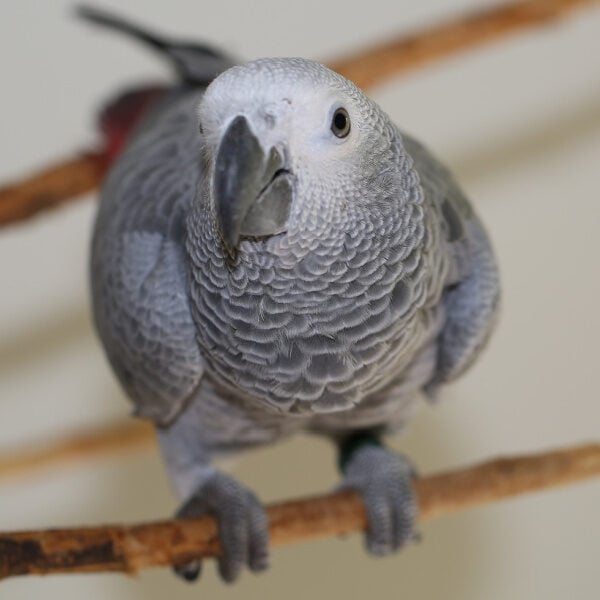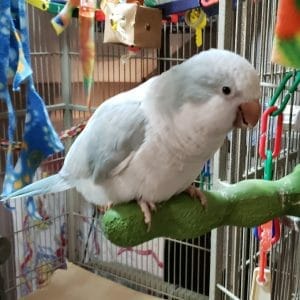
My Bird/Your Bird – Break Up Decisions and Creating the Blended Family With Parrots
Last Updated on by Mitch Rezman
I started making my way across the earth in the middle of the last century.
I traveled terrestrially and airborne as my father Norman was a vagabond pilot – sure, I’d love to have a coffee and chat about that sometime.
If you are a baby boomer you may remember probably what was one of the first chain stores – Woolworths
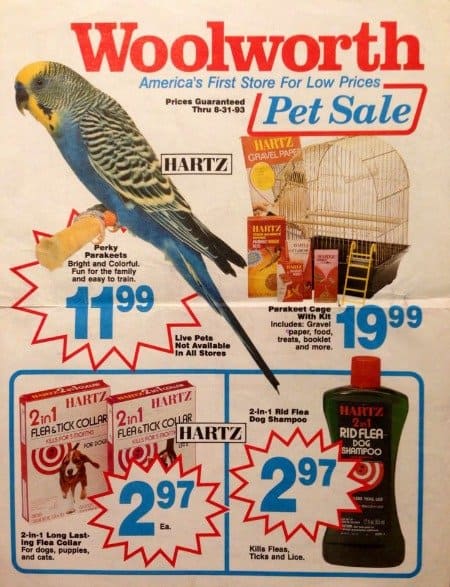
Parakeets, Budgies as we know them – three bucks. Today I see budgies (and for those of you who don’t know, we do not sell any birds and only have one bird ourselves, as that’s all that time allows for) for $15 maybe $20. Budgies, much like turtles and especially hermit crabs with those adorable NFL football licensed shells are considered by and large, disposable pets in today’s society. And that is a shame because I’ve related a story (from an avian veterinarian) here about a budgie that was still going strong at 26.
The customer pool of caged bird keepers that have had a bird(s) in their life 20 and 30 and 40 years is not a very deep pool. We bring these animals into our lives and find they are much more complicated than we ever imagined.
I have a relationship with a fluffy pure white cockatiel. Popcorn will spend time with Catherine and demand some sort of attention but I am clearly her (well both Popcorn AND Catherines now that I think about it) chosen mate. I have related our morning routine on many occasions.
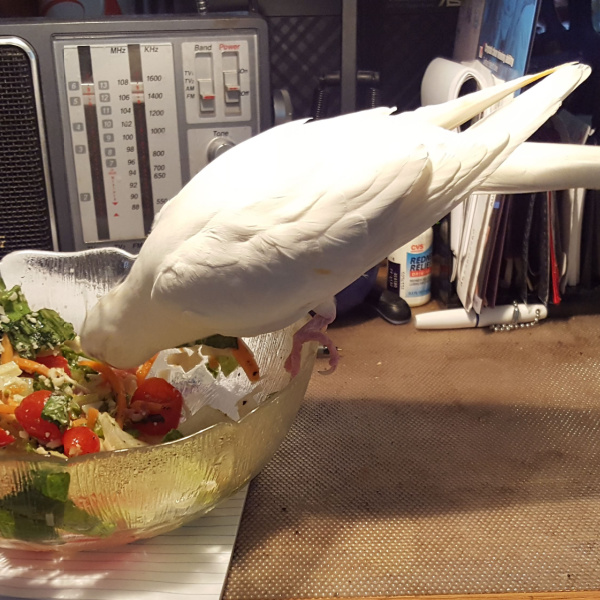
I traverse our 70 foot long Chicago apartment. Bedroom, bathroom, other bedrooms, kitchen, desk. Wherever I go I hear the very subtle woosh-woosh-woosh of an incoming cockatiel alighting on the dozens of landing zones we have agreed upon.
For those of you counting, its been about 40 days since she laid her last egg. Her apartment migration activity keeps her mind off being a mommy. She still thinks that I don’t see her go in behind the towels in the bathroom but I don’t give her an inch and bring her out immediately so she is not too comfortable back there – thinking mommy thoughts.
And we chat. I use the English language. She whistles. I do not know how it works but we both know what each other talking about and many of you know exactly what I mean.
I know how smart animals are. I have been up close and personal with dressage horses (and falconry). I have bred standard poodles – one of the smartest breeds of dogs that I have ever encountered. I actually met a likable and smart cat or two. But can any of those species make and then use a tool?
And can dogs fly? Sure but they need a little help
Birds are pets that occupy all three dimensions, they can be anywhere in your home which is both a good and a bad thing (caged bird keeper’s rule number 54 – always know where your bird is in the home, flighted or not ).
I find it an enchanting way to engage a pet. I love when her feet scrape my ragged scalp as she flies to meet me in the kitchen from the living room.
Memo to yuppies: I see you in our neighborhood with a dog tethered to a human pushing an aerodynamic projectile a.k.a. jogging stroller with an infant strapped in.
You are not only not cool – but I hope for your sake and more so for your child’s sake (because you are a dumbass) that your 70-pound dog doesn’t like chasing squirrels.
Now, this – this is cool!
And do not take my word for it. If you want to know if birds are special – just ask this guy
Yeah we know all about the Pope does 2 doves incident – Hey sh#t happens even with Popes.
There are shells and scales – there are fins and fur. For us, the caged bird keepers – well it can best be said by Samuel Clemens aka Mark Twain.
She was not quite what you would call refined. She was not quite what you would call unrefined. She was the kind of person that keeps a parrot – it is all about the feathers.
I am big on plans. I make a plan and stick to the plan until it stops working. Then I create a new and better plan.
You have got the bird. Forget the expensive cage and the bird food you tossed in the garbage because your bird does not like banana-shaped Zupreem. You are able to bite your lip (until it bleeds) when your sweet bundle of feathers punches a hole in the left boot of your $200 Uggs.
But have you given thought to the unthinkable? When things go nuclear? A shift with your – relationship – job – housing? In other words – what’s your plan when life takes a left turn?
We explore that starting now.

Sometimes our lives change drastically, sometimes suddenly or sometimes slowly.
A divorce happens or a new partner comes into the picture. How do we help our parrots deal with this transition?
And what if you are both parrot parents? Will the birds get along?
Will they get along with the new people in their lives? What about children transitioning?
And in the case of a breakup, what is best for the parrot(s)? Who should get the bird(s)? That can be a really hard decision and cause much stress for both humans and parrots.
I just had the second case happen. When I got Mango the sun conure, he was only 4 weeks old and I was totally single. I finished hand feeding him and he was bonded to me.
He was also well socialized and would interact with people of either gender. As he grew up, however, he developed a bit of preference for men.
Then I entered a relationship and the first time Kevin met my sun conure, Mango went nuts for him. It was a case of love at first sight.
Later Kiwi came into the family. But then last week some issues that had been brewing for some time came to a head and I left the relationship.
I suddenly had to make a really hard decision. While I knew that if I took the birds, Mango would interact with me but he would seriously miss Kevin.
Additionally, my life was in a transitional phase. I came to the decision that Mango and Kiwi were better off and would be less stressed by leaving them with Kevin, even though they had started out as MY birds.
I will still make myself available to clip wings, give advice, help the birds in any way I can but I can’t say I am happy about leaving them.
However, sometimes we have to do what is best for ourselves and I know Kevin really loves those two birds and will care for them. Once things settle down, I will open my home to a parrot that needs love and a home.
I am glad that it didn’t come to a situation like those I’ve seen in far too many break-ups where birds are involved.
Some people use the birds as tools to hurt the person the birds love best and it is always the parrots that suffer in these situations.
I knew a beautiful Quaker that had become a cage-bound feather plucker because a person had taken the bird from its best-loved human and then failed to provide it a quality life for years before rehoming it to someone that cared about birds.
That was really sad and the person that accepted the Quaker for rehoming was working hard with the bird to get it to trust humans again.
On the other hand, people have the opposite happen and enter a relationship (this happened with Bell). One party may own a parrot(s) or they both may have birds. Creating a blended family can be challenging for both the people and bird(s.)
First of all, the bird(s) have to get to know and (hopefully) trust the new person, and if children are added to the blended family there may be several new people in the bird’s life.
The new person or people may have to be taught about parrots if they are not already experienced, parrot people. Sure, you’ve shown the person pictures of your beloved parrot, but unless you’ve lived with the parrot, you really don’t know how to deal with it. Every parrot is somewhat unique and every person is unique.
Hopefully, before blending a family, a great deal of time has been spent in the process of allowing everyone, birds included, to get to know one another and the bird won’t become too stressed.
If it happens to be you and the parrot moving to a new location to create the blended family, you’ll want to provide a calm transition person for the bird(s) so that they can adjust to their new environment. The birds may be leery of the massive changes that are occurring and need time to realize they are still loved and cared for.
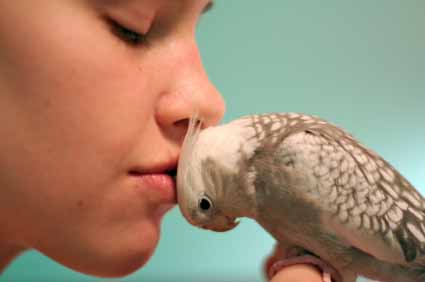
It is important to develop a proper interaction between the new people and the birds to prevent jealousy on the part of the parrot(s).
If a bird is strongly bonded to one person rather than being a very social bird, the parrot may view the new partner as a rival rather than an added caregiver that will love them.
Of course, you might end up in the same situation I did where the bird bonds really strongly with the new person, virtually abandoning its original owner.
We can’t just decide what person or people a parrot will bond with. I really think that Mango had experienced a bit of separation anxiety when I was repeatedly hospitalized for a major health issue when he was young, resulting in his ability to rebound so strongly. But I will write about that in another post.
My point is that if your life suddenly changes, whether due to a breakup, death, or new people entering the birds’ life in a situation expected to be permanent, the welfare of the parrot should be considered as it is a member of the family too. Every situation and every parrot is unique, so I can’t tell you exactly what to do in your unique situation, but don’t expect the parrot to adjust immediately. Allow it time to be quiet and adjust if it indicates it needs it.
Consider ways you can allow the bird to make the transition smoothly and slowly. Pressuring a parrot to accept a new situation suddenly, although sometimes that can’t be avoided, can cause the bird to begin bad behaviors such as feather plucking or over-grooming.
If additional birds enter your bird’s life during a transition, you should first allow all the birds a calm adjustment period where they are allowed to get to know the new people and birds.
Once they’ve all had time to get through the stress of adding new birds, you can slowly allow the birds to interact with each other, but only with supervision. If the birds get to know and love each other, as Kiwi and Mango did, they can eventually be allowed to interact without supervision.
But not all parrots accept other birds as friends. You have to monitor the birds when they interact and base any decisions on how well they get along. If they do not get along, you may have to schedule quality time out of the cage so that the birds do not harm each other.
Written by Mitch Rezman
Approved by Catherine Tobsing
Author Profile

Latest entries
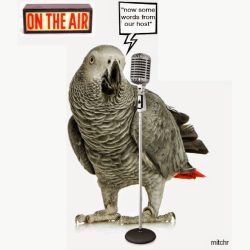 Bird & Parrot CareJune 20, 2025Understanding the Best Way to Use Prevue Pets Mimic Me Voice Trainer
Bird & Parrot CareJune 20, 2025Understanding the Best Way to Use Prevue Pets Mimic Me Voice Trainer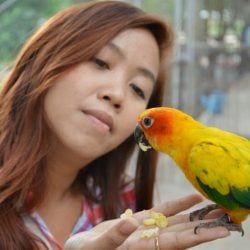 Bird BehaviorJune 6, 2025How Do I Keep My Parrot From Dumping His Food Every Day?
Bird BehaviorJune 6, 2025How Do I Keep My Parrot From Dumping His Food Every Day?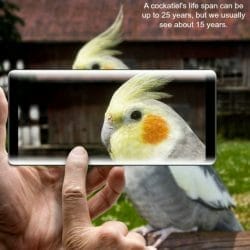 Birds & LightingMay 16, 2025I Am Seeking Clarity About Lighting for My Birds Cage
Birds & LightingMay 16, 2025I Am Seeking Clarity About Lighting for My Birds Cage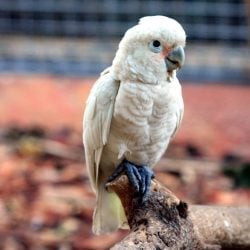 Bird RescueApril 29, 2025How Do We Re-Home a 17 yr Goffin Cockatoo?
Bird RescueApril 29, 2025How Do We Re-Home a 17 yr Goffin Cockatoo?

